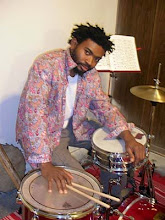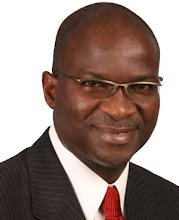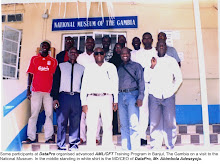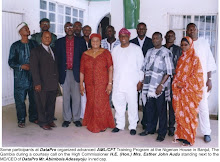2009 Budget: A Nigerian is worth N2.80k health care service per day.
Dayo Adejobi
The emergency unit of the Wuse Hospital in Abuja was the only facility Mrs. Amina Bawa could take her ailing child after realizing that her only daughter had severe malaria symptoms. Unfortunately, getting to the hospital at the time she did could not save the life of her daughter Aisha, because there was no nurse to attend to her in the densely-populated hospital. Aisha died right in the arms of her mother at the hospital. Why? becomes the question. So many reasons could be responsible but suffice it to say that this is the provision of the 2009 budget for the common Nigerian.
According to 2009 Federal Government budget presented to the National Assembly in December last year on the premise to reduce poverty and help Nigeria attain its proposed Millennium Development Goals, Aisha’s life was worth only N1, 022:00 for the year, a meagre fraction of the Total budget valued at N3.1 trillion, which of course is not enough to treat malaria or provide necessary amenities for the hospital.
This was the crux of the Three-day Media Training on Accountability and Budget Monitoring organized by Journalists Against AIDS (JAAIDS) with funding from the Ford Foundation,West Africa at the Gateway Hotel, Ota, Ogun State from July, 14 to 18.
Executive Director, JAAIDS, Olaide Akanni said the programme was organized to build the capacity of journalists on budget reporting and information sourcing, thus equipping the contemporary journalist with the knowledge and skills to better advocate for and secure HIV and AIDS policies that are all inclusive, transparent and using the media as a platform to discuss issues of HIV and AIDS policy formulation and implementation in Nigeria.
According to an independent extensive survey report recently conducted in Nigeria and published by the International Budget Partnership with head office in America , Nigeria’s rating stands at 19% on the Open Budget Index indicating that the government provides the public with scant information on the central government’s budget and financial activities during the course of the budget year, the most important economy policy instrument which reflects the state or nation’s priorities .And as such this makes it very difficult for citizens to compare government performance with activities planned and hold government accountable for its management of the public’s money.
In his presentation titled: Transparency and Accountability: A Key to Development and Good Governance, Executive Director Africa leadership Forum, Ayodele Aderinwale eulogised on the basic tenets upon which the budget of any Nation is written namely :for Planning, Communication, motivation and control ,all of which provide the ordinary Nigerian citizen with an insight into the Federal Budget preparation and implementation process and specifically, what the 2009 Budget holds for all Nigerians, thus to increase budget openness and transparency by shedding light on how the Government uses the Federal Budget as a tool to manage the nation’s finances and other resources. “Once there is power without responsibility, the whole issue of good governance, which has been described ‘‘as a social contract between the people of a country involving the expenditure of public resources, effectively and productively in such a manner that the welfare and quality of the citizenry are improved’’ takes a back seat,’’ he said.
Aderinwale charged Nigerians to be more vibrant and active in the governance process, thus demanding and securing accountability, transparency and openness from power elite, local government chairmen and politicians at all levels. He also charged the government of the day, which he referred to as ‘‘one garbed with a slew of secrecy, ostensibly in the name ‘national security and defence’ to atrophy the values to enthrone transparency and accountability.
Based on the budget analysis with refence to the 2009 budgetary allocation, Toyin Adeleke of the Budget and Advocacy Unit, JAAIDS said it is quite obvious that health and education sectors of the 2009 budget were less prioritized at five and seven per cent respectively and are not of utmost priority to our government, whereas, both are the bedrock of development. What then is the sense in the defense sector taking a large chunk of our total budget when we’re not at war? Another key means by which she put the budget in context was to compare it to the size of the nation’s Gross Domestic Product (GDP) seven per cent, a measure of the nation’s full economy. An indication of the basic measure of Nigeria economic performance shows that our budget is 4.1% of Nigeria’s current Gross Domestic Product which compares favourably with the 6.6% recorded so far in 2008. Overall, the government should enact Changing policies, positions and programmes that are action oriented. ‘‘She stressed’’
.
Analysing Global financial meltdown and Implications for HIV/AIDS, Lecturer at the Department for Industrial Relations and Public Administration, Dr Banji Fajonyomi said though the global economy is teetering on the brink of recession. The downturn after four years of relatively fast growth is due to a number of factors: the global fallout from the financial crisis in the United States, the bursting of the housing bubbles in the US and in other large economies, soaring commodity prices, increasingly restrictive monetary policies in a number of countries, and stock market volatility. In the midst of it all, he stated that Nigeria was still largely unaffected by the crisis due to the absence of close-links between local banks and the ailing global banks, government must not be complacent. A large chunk of the money allotted to the defense sector would have gone a long way in providing many necessary equipment in our general and teaching hospitals. A huge sum of N44 million appropriated monthly for each of the 469 members of the National Assembly, while many Nigerians cannot even afford two meals per day. The scenario from the budget is as good as having one Nigerian been entitled to N2:80k for his/her health care on daily basis which could not buy a Panadol Tablet for headache.
From the budget, it is also obvious that large sum of the budget will be spent on salaries leaving little for capital projects such as roads, hospitals, schools and refineries. e.t.c. As a result of this, constant electricity supply, quality education, good health-care delivery and other necessities of life may continue to elude the common man in the country thus defeating the focus of this administration on delivering on the promises of Seven-Point.
Furthermore, a Research and Budget Consultant with Action-Aid Nigeria, an international non-government organization (NGO), Abimbola Adewunmi analyzed the whole systems and procedures through which government decides what programmes and activities to undertake, allocate resources to these purposes, accounts for the resources and assesses the results. She said though the health budget increased by N5 billion in 2008 to N143 billion in 2009 but the per capita spending of the total budget of Nigeria’s population is N22,200 for the year while the common Nigerian is worth N60.82k value of services based on the 2009 budget.
Abimbola elucidated on the insensivity our legislators who exhibit their selfishness and insensitivity to the plight of Nigerians in their decision to take from the meager health and education budget to dualise the Abuja airport road. This can also be seen in the words of the Bayelsa State governor, Timipre Silva, who was given the N60 billion stolen from the state coffer by former governor Alamiesiegha which he said would be used to build a Transparency plaza.
According to indices raised by Adewunmi, The 2009 budget on itself is not the problem but the performance of the budget and the value it has added to the citizen is in question here.
Recently the budget office has put on their website the 1st quarter progress report of the federal budget which stands at 52.7% on capital vote, the question here is "does 52.7% translate to the various projects near completion or its the amount of funds that has left the government coffers?
Citizens need to feel and see the value and performance from the budget in terms of the basic needs which include quality and timely access to health care, regular power supply which will boost all sectors of the economy, quality teaching and facility in government schools to curb the exploitation of the so called private schools, clean portable water, safe road network, safe and affordable transportation, quality and affordable housing.
But what we see from the budget year in and out are numeric figures that don't speak to the people, inceasable arguements between our legislatures and the President, conflict and confusion between the Federal and State government on who's responsible to provide basic needs for the people.
The price of fiscal indiscipline has eaten deep into our system and is rotten. We need a cleansing solution to make it whole again, we need real performance not phanthom performance.
The question on the lip of every Nigerian is: When will the plight of Nigerians become the concern of our leaders?
In the words of International Press Center Cordinator, Lanre Agogundade,the clouds over the management of public funds at the three day training event have served as a wake up call on Nigerians to demand how elected leaders handle public funds and as such the contemporary journalist is charged with the professional responsibility of reporting true, accurate and note-worthy information. Though tricky, but it is important to tailor your content to the average Nigerian.
Subscribe to:
Post Comments (Atom)
















No comments:
Post a Comment